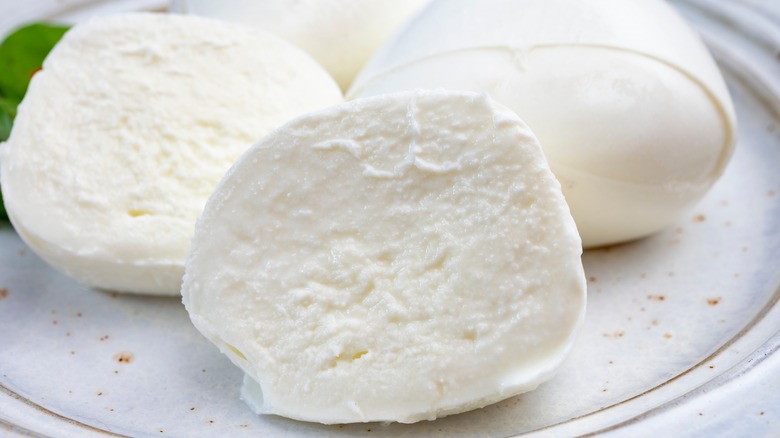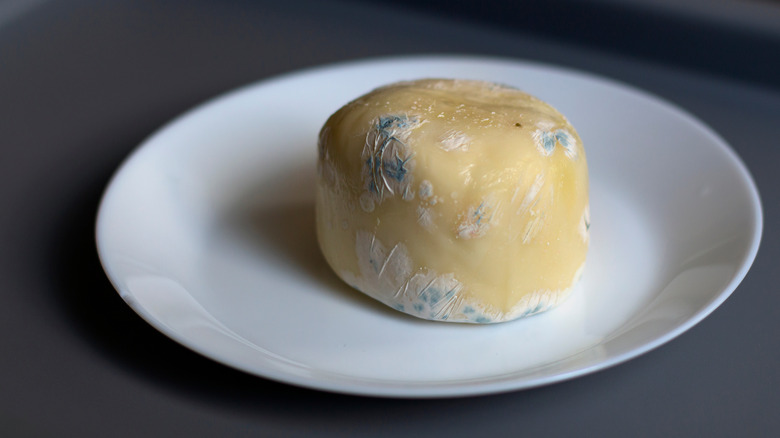The Right Way To Store Fresh Mozzarella In The Fridge
Fresh mozzarella, those globes of glistening, pillowy cheese, is as delectable eaten on its own (as part of a cheesy midnight snack, perhaps?), tossed onto a charcuterie board, on a pizza pie, in a switched-up Caprese salad, or even stuffed inside some golden-brown arancini. But while you're waiting to open a package, or if you don't use up the entire ball at once, you might wonder: What's the right way to store it in the fridge?
While mozzarella is one of those cheeses that is best eaten quite soon after it's been purchased or made, it can be stored in an airtight container filled with cold water or olive oil. Because of the fresh cheese's high moisture content (which is very different from the low-moisture shredded variety), it will maintain its quality and flavor longer by being kept in some kind of neutral liquid.
This is especially important if your mozzarella came packaged in water or olive oil in the first place. But in any case, once you open it, move it from its original packaging into a container with an airtight lid, filled with enough liquid so that at least half of the ball is submerged. Be sure to eat or cook it ASAP.
More tips for storing fresh mozz
Once you've submerged your mozzarella in water (or olive oil), you have about one week to eat it before it'll start to go bad. However — and this is a big however — mozz is, unfortunately, a high maintenance cheese, and the water should be changed daily, or at least if it starts to get cloudy or smells just on the brink of funky.
You can also consider the liquid the cheese was sold in when it comes to storage. Give the original liquid a taste; if it tastes like plain water, you can store it in plain water. If it has a salty flavor, however, you should store it in liquid that reflects how it was packaged. Dissolve 1½ tablespoons salt in a pint of water to create a saline solution for storage.
You might be wondering if you can freeze mozzarella to really stretch its shelf life. The answer is yes, but it will change the texture quite a bit, so it's perhaps best to freeze it only if you're going to be mixing it or melting it into a dish (versus eating it as a standalone ingredient). Wrap it up in tin foil or plastic wrap and pop it into a freezer bag for good measure. Fresh mozz stays good for about three months in the freezer, and you should let it thaw in the fridge overnight before use.
How to tell when your fresh mozzarella has gone bad
Even when you store your mozzarella properly, it can start to go bad earlier than anticipated — or perhaps you've lost track of how many days it's actually been in the fridge. Either way, mozzarella cheese shows unmistakable signs of spoilage, including the smell. Mozzarella that is good will have a clean, fresh smell with a slight tang, while bad mozzarella will smell sour, rancid, and rotten. It's distinct and will likely make your face crumple up in disgust.
If a bad odor hasn't afflicted your cheese yet, perhaps you'll notice a change to its texture, because while good mozzarella is pillowy and soft, bad mozzarella can turn hard and tough. When the liquid over and around the cheese has gone slimy, too — more syrupy than watery — that's another signal that it has reached the end of its life.
Finally, if you see mold growth anywhere on your mozzarella cheese, that is a sure indicator that it has gone over to the dark side and there is no turning back. While it's true with some cheeses that a little mold doesn't spoil the entire block, that is simply not the case for fresh cheese, as the high moisture within allows mold spores to spread more deeply.


